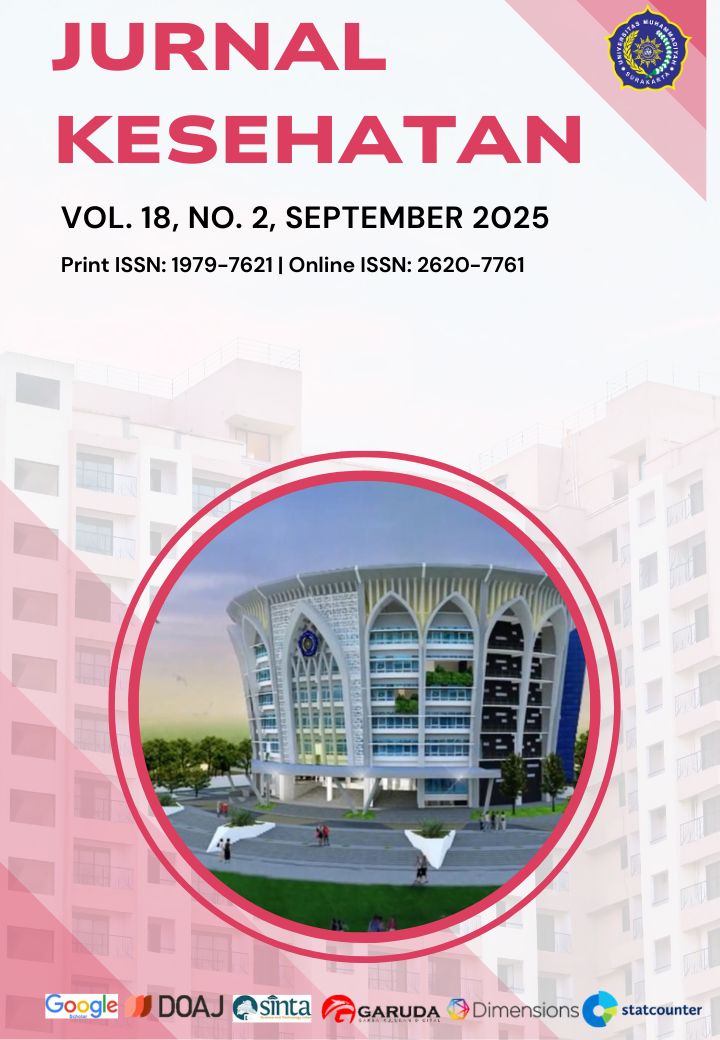Relationship between Work Motivation and Performance of Civil Servants at the Pinrang Regency Health Office
DOI:
https://doi.org/10.23917/jk.v18i2.10963Keywords:
Job satisfaction, motivation, working conditionAbstract
Pendahuluan: Motivasi kerja merupakan faktor penting yang mempengaruhi kinerja pegawai negeri sipil (PNS), terutama pada sektor pelayanan publik seperti Dinas Kesehatan Kabupaten Pinrang. Metode: Penelitian ini bertujuan untuk menganalisis hubungan antara motivasi kerja dengan kinerja pegawai negeri sipil, menggunakan pendekatan kuantitatif dan rancangan cross-sectional. Sebanyak 93 pegawai negeri sipil diambil secara total sampling, dan data dikumpulkan melalui kuesioner skala likert dan dianalisis menggunakan uji Chi-square. Hasil: Hasil penelitian menunjukkan adanya hubungan yang signifikan antara aspek gaji (p = 0,003), kondisi kerja (p = 0,026), keselamatan kerja (p = 0,001), dan solidaritas (p = 0,014) dengan kinerja pegawai, sedangkan kesejahteraan tidak menunjukkan hubungan yang signifikan (p = 0,127). Meskipun 59,1% pegawai tergolong berkinerja baik, masih terdapat 40,9% yang berkinerja kurang, menunjukkan pentingnya peningkatan motivasi kerja sebagai strategi peningkatan kinerja. Kesimpulan: Temuan ini menggarisbawahi perlunya perhatian terhadap kebutuhan dasar karyawan, baik fisiologis maupun sosial, untuk mendukung pencapaian target layanan kesehatan yang optimal.
Introduction: Work motivation is an important factor affecting the performance of civil servants (PNS), especially in the public service sector such as the Pinrang District Health Office. Method: This study aimed to analyze the relationship between work motivation and civil servant performance, using a quantitative approach and cross-sectional design. A total of 93 civil servants were taken by total sampling, and data were collected through a Likert scale questionnaire and analyzed using the Chi-square test. Results: The results showed a significant relationship between aspects of salary (p = 0.003), working conditions (p = 0.026), work safety (p = 0.001), and solidarity (p = 0.014) with employee performance, while welfare showed no significant relationship (p = 0.127). Although 59.1% of employees are classified as performing well, there are still 40.9% who are underperforming, indicating the importance of increasing work motivation as a performance improvement strategy. Conclusion: This finding underscores the need for attention to employees' basic needs, both physiological and social, to support the achievement of optimal health service targets.
Downloads
Downloads
Submitted
Accepted
Published
How to Cite
Issue
Section
License
Copyright (c) 2025 Andi Akram Dzakwan, Zulkarnain, Pratiwi, Mardhatillah

This work is licensed under a Creative Commons Attribution 4.0 International License.










